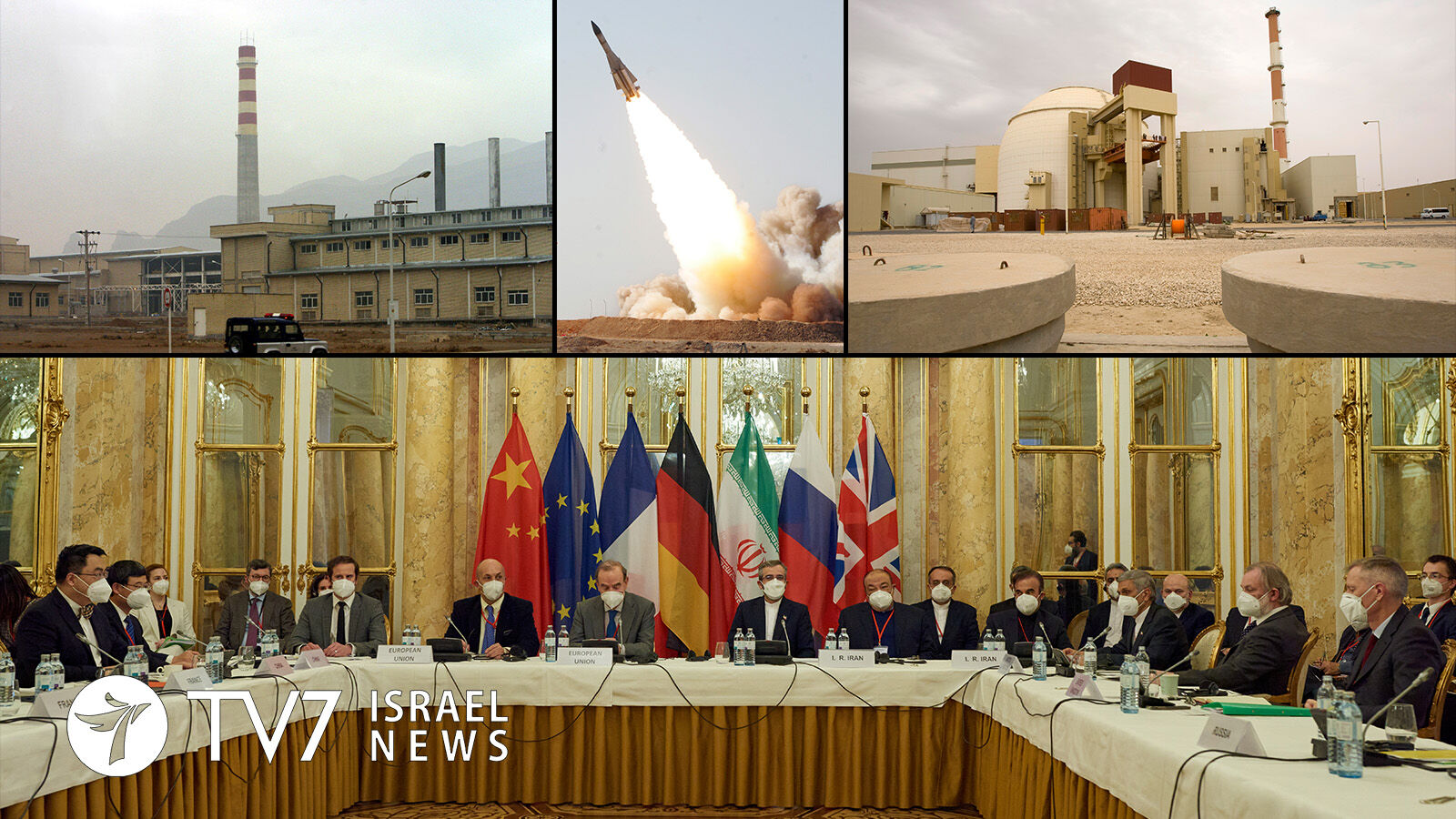Negotiations in Vienna between Iran and the P5+1 nations of the United States, Russia, China, France, United Kingdom and Germany have reportedly advanced.
By Jonathan Hessen and Erin Viner
Two European diplomats familiar with discussions to revive the 2015 Joint Comprehensive Plan of Action (JCPOA) say that “a limited change in attitude by the Iranian delegation has allowed for some progress,” although “wide-ranging gaps remain on almost every issue” still remain.
Israeli officials have increasingly come to believe that the Vienna Talks will ultimately culminate in an agreement, amid their own intelligence assessment.
The Jerusalem security establishment is thus bracing for a projected scenario Tehran’s regional proxies would be provided with an influx of funds from the Islamic Republic that are currently frozen under stringent US sanctions, while the diplomatic corps is extensively engaged in efforts to limit the scope of concessions that may be adopted in Vienna.
Among other discussions, Israeli Foreign Minister Yair Lapid addressed “challenges posed by Iran” during a telephone conversation with his US counterpart Antony Blinken, after which a State Department Statement noted that “Secretary Blinken reiterated the (Biden) Administration’s ironclad commitment to Israel’s security.”
State Department Spokesman Ned Price also acknowledged in a telephone briefing that “some modest progress” was achieved this past week. While expressing Washington’s hope to “build on that (progress)” during the ongoing negotiations, Price also warned that, “if we do not soon reach an understanding on a mutual return to compliance, Iran’s accelerating nuclear steps will increasingly diminish nonproliferation benefits of the JCPOA.”
The State Department Spokesman underscored that “even if there has been some progress, the fundamental situation really remains – the necessity for Iran “to exercise restraint in its nuclear program and pursue negotiations in Vienna seriously.”
It is important to highlight that the main challenge from the perspective of the US and its three European allies France, Germany and the UK is a resounding lack of trust in the Ayatollah regime.
“We are pulling in the same direction when it comes to Iran and the JCPOA,” commented Berlin’s new Foreign Minister Annalena Baerbock following her first visit with Secretary Blinken in Washington. “The discussions and negotiations in Iran are entering a crucial phase. Iran has squandered a lot of trust and there is not much time, but we intensively use this time together in Vienna,” she added.
Despite indirect engagement by both sides in Austria, however, Iranian-proxy militias have stepped up attacks against about 2,500 US troops stationed in Iraq at the request of the Baghdad Central Government.
Western intelligence officials speaking to TV7 on condition of anonymity said that Tehran intends to deploy its proxies to execute sporadic missions against American forces in the region until they are forced to be withdrawn in what can be proclaimed as an Iranian victory.
The US-led International Coalition for Operation Inherent Resolve announced the recent interception of 3 armed drone attacks on the Ain Al-Assad Air Force Base that hosts American servicemembers, but stopped short of confirming local Iraqi reports accusing the Iran-backed al-Ḥashd ash-Shaʿbī alliance of responsibility.
The escalation of violence comes coincides with the second anniversary of the assassination of the Islamic Revolutionary Guards Corps (IRGC) elite Quds Force Commander Qassem Soleimani and leader of the Iranian-proxy Kataib Hezbollah Abu Mahdi Al-Muhandis.
Iran and its allies in Iraq and other countries have been holding events in tribute of the late leader of the Quds Force, which is the IRGC’s overseas arm.
Thousands of protestors from the Iraqi Shi’ite paramilitary groups in front of Baghdad’s fortified Green Zone, where they shouted anti-US slogans.
“We want to labor for the blood of martyrs, justice for the blood of martyrs, and the complete exit of foreign forces from Iraq. We will not accept anything less,” declared leader of the ‘Badr’ Iranian-proxy in Iraq, Hadi Al-Amiri, insisting, “We will not stop pursuing this goal, and we do not hesitate. Foreign forces must exit completely from Iraqi land. We must achieve complete national sovereignty for Iraq.”
An Iraqi member of the (Iranian-proxy) Ḥashd ash-Shaʿbī identified as Abida Hussein was cited by Reuters as saying, “(We want) everyone to listen to us, all of Iraq to listen to us. We do not want America in Iraq; we don’t even want the (U.S.) Eembassy in Iraq. We protect ourselves on our own.”
Iranian President Ebrahim Raisi has pledged to exact vengeance if former US President Donald Trump and former Secretary of State are not prosecuted for their roles in the 3 January 2020 airstrike that killed Soleimani and Mahandis.
“If Trump and Pompeo are not tried in a fair court for the criminal act of assassinating General Soleimani, Muslims will take our martyr’s revenge,” Raisi said in a speech at a memorial ceremony to mark the 2nd anniversary.
“The aggressor, murderer and main culprit – the then president of the United States – must be tried and judged under the (Islamic) law of retribution, and God’s ruling must be carried out against him,” Raisi demanded.
“We will not use criminal means, but Iran has its own style,” asserted Soleimani’s replacement Brigadier General Esmail Qaani at another memorial, vowing, “The glorious path of resistance continues, and the sword of resistance will remove all obstacles in Iran’s development.”
Leaders of the Islamist Hamas and Palestinian Islamic Jihad Gaza-based terror organizations, which closely collaborate with the Ayatollah regime, attended a memorial at the gravesite of the assassinated Iranian general.
According to one Iranian at the service, Islamic “pilgrims” came from 63 countries to “pay homage” to Soleimani, showing “the longevity of the martyr.” He added that while, “Trump thought the resistance would end with their deaths and General Soleimani would be destroyed and nothing would be left of him, but his blood helped the resistance more than his life and it united people,” the Iranian people have been calling on their government “to strike a hard blow to the mouth of the United States.”
